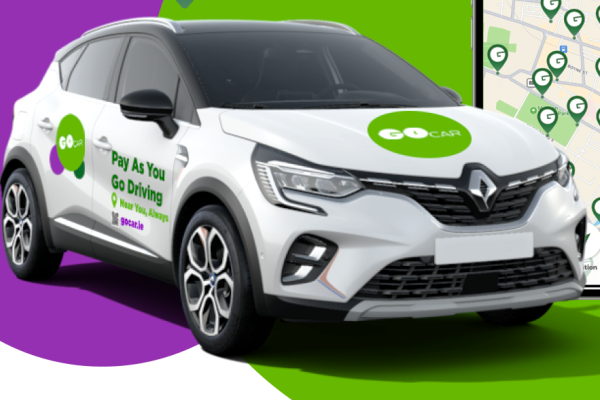
![]()
The latest GoCar Index show the financial costs of car ownership are deeper than ever - the increase in the price of petrol and diesel in recent years has led to 24% of people driving less often.
Over 55s were the most affected, with 28% saying they drive less due to rising fuel costs, while under 35s were the second most likely to cut back on their car usage. Although fuel costs have moderated somewhat in recent months, the price of petrol is still up 33% since 2021, while diesel is 39% more expensive.
Motivated in part by rising costs, many households with two cars are considering giving up their second vehicle. This is especially true of younger drivers with almost 28% of those aged under 35 are thinking about giving up their secondary vehicle.

GoCar
The GoCar survey reveals that two thirds (67%) of respondents admitted that their friends and family would think them ‘mad’ to give up their cars, demonstrating that private car ownership is something which is deeply embedded in the Irish psyche.
GoCar drivers only have to pay for a car when they actually need it - rather than a typical driver, who pays for a car that is left unused 92% of the time (2).
Dublin has been ranked as the second slowest city in Europe (3). The government has worked to reduce the number of cars on Irish roads, mainly due to rising congestion and the impact heavy traffic has on the environment and on society.
GoCar user data shows that 60% of the company’s customer base would buy their own vehicle if they didn’t have access to the car sharing service. Each GoCar takes multiple private cars off the road, lowering air pollution and CO2 emissions. Car sharing also presents an opportunity to get more people driving electric vehicles (EVs).
While the government has previously stated plans to get almost a million EVs on the road by 2030, there are currently only about 110,000 EVs driven in Ireland. The GoCar Index shows that the expense of EVs is still an issue - 40% said the high price of EVs is one of the barriers to buying one.
Based on the impact of similar services abroad, the GoCar EV fleet could potentially save over 300 metric tonnes of CO2 emissions per year (4).
So not only does the GoCars service help take private cars off the road, but it also helps in lowering emissions across the country. The GoCar Index takes a closer look at why some people are considering giving up their cars and why many others are still reluctant to do so.
This report explores the behaviour of motorists - what kind of journeys they make, how far they drive and how often. This Index has been conducted by GoCar in partnership with Amárach Research and was compiled from a nationally representative sample of 1,200 adults in November 2024 in the Republic of Ireland.
95% said they owned or co-owned a car. The survey found that one in five car owners (22%) own two or more cars. Ensuring they could meet their family’s needs was the most common reason for this, cited by over half (52%) of those who own a second car.

GoCar
The other key reason was ensuring people could get to work, which was stated by 34% of second car owners. The car is the most popular method of commuting in Ireland (5). It’s the mode of transport of choice for more than half the population with 59% driving and a further 4% travelling as a passenger in a car.
Among those who drive, work was the most common reason they spend so much time behind the wheel, 40% of respondents use their car to commute to work every day, up 3% from the 2024 GoCar Index (6). There was also a decline in the number of people who said they never use their car to get to work (32%) - a decrease of 4% (36%) from the 2024 Index.
Outside of work, people most commonly used their car to bring their children to school (25%). Visiting friends and family (17%), going grocery shopping (16%), and going to the gym or exercising (11%) are all increasingly common uses.
More than half (59%) of drivers use their car at least once every six months to go on short breaks in Ireland. There was a smaller group who went on more frequent getaways - almost one in five (19%) said they use the car four times a year to travel across the country for holidays or weekends away.
The number of respondents who went on monthly trips rose from 5% to 7% year on year. Notably, there was a signifi cant increase in the number of people who use the car every six
months to attend major leisure activities, such as art or music festivals. This increased from 52% in 2023 to 59% in 2024 (7).
A major finding from the research was Ireland’s car usage. iIt has found that car journeys tend to be short - both in terms of distance and time. The GoCar Index has revealed that the majority of the Irish public use their cars for shorter journeys.
• Over three quarters (77%) of car journeys across Ireland are completed in less than 30 minutes.
• Nearly one in three motorists (28%) drive less than 5 kilometers per trip, roughly in line with 2023 (29%).
• 15% of respondents travelled between 6km and 9km when they drove, the same as last year (15%).
In line with this, the amount of time spent on these journeys tends to be short.
However, congestion means the time to complete these shorter journeys is trending upwards, at least in Dublin. It takes an average of 29 minutes and 30 seconds to travel only 10 kilometres in Dublin, making it the second slowest city in the Europe (8) .
User data from GoCar shows that the average return distance of a GoCar trip is 86km, suggesting that GoCar customers use the cars for more intentional trips rather than brief, potentially unnecessary journeys.
Cars are an essential part of living in Ireland - the country has been identified as having the second highest level of car dependency in the EU. A 2022 European Commission survey found that three quarters (76%) of Irish people used a car as their main transport mode on a typical day – the second highest in the EU, behind only Cyprus, which stood at 85% (9).
A significant number of households also have multiple vehicles - one in five car owners have two or more vehicles, 22% in 2024 compared to 21% in 2023
The 2025 GoCar Index found that almost one in five (15%) said they would be open to giving up a secondary car over the next few years.When looking at whether drivers would give up
their primary vehicle, one in ten (10%) said they planned to do so in the coming years.
Young people are much more likely to consider giving up their car, with 21% of respondents under 35 saying they were thinking of giving up their primary car in the next few years, while 28% were weighing up getting rid of their secondary vehicle.
This was probably because 46% of people in that age group said they could save a ‘considerable’ amount of money if they didn’t rely so much on a car. The reasons given for Ireland’s high level of car usage are varied but generally include relatively poor access to reliable public transport, particularly in rural areas.
70% of respondents said they would be more likely to give up a car if they had access to better public transport. The increasing cost of running a car came in a close second, with 65% saying that higher prices would encourage them to give up their vehicle. This was up from 62% in last year’s survey.
Working from home was the third most-cited reason for getting rid of a car at 36%. Studies from national bodies have noted that lower levels of car ownership tend to encourage the development of better public transport, helping to reduce the overall number of vehicles on the road (10).
Two-thirds (67%) of the GoCar Survey respondents believe their families and friends would think it ‘mad’ if they gave up owning a car. Over 1 in 10 (11%) are hesitant to give up the car as others rely on them. However, 18% would like to use the car less often but are unfamiliar with the alternatives.
Car sharing has emerged as a possible solution - from a cost perspective, it can make a lot of sense. The savings offered by car sharing services have even been recognised by the Sustainable Energy Authority of Ireland, which said that app based car sharing companies ‘offer short term rentals from an hour at very reasonable costs.
The potential benefits have also been recognised by international bodies such as the OECD, which has said that car sharing could help to take cars off the road while also being good for the environment.
For those who are willing to look at car sharing, the GoCar survey confirms how much finances impact their decision. 47% of people said their main reason for using car sharing services is to have ‘freedom from running costs’ - this was up 6% from 41% in 2023.
The GoCar survey showed that car sharing and car rental are alternatives which about a fifth (18%) of people would be willing to consider if they do not wish to own a vehicle.
When asked how likely they were to use transport alternatives to car ownership in the next 5 years, the most popular response to the survey was ‘carpooling’ - 20% of respondents said they were ‘likely’ or ‘very likely’ to do this. ‘Car sharing’ came in second place, cited by 17%, while 16% identified car rental.
Young people living in urban apartments were the most likely group to have actually tested out these alternatives to car ownership. However, this almost doubled to 19% among 25 - 34 year olds. One in five of people surveyed in Dublin had used a car sharing service, while the figure was as high as 31% for those who live in apartments.
GoCar user data with over 3,500 responses also found that 60% of its customers would buy a car if GoCar didn’t exist – again demonstrating how car-sharing services help to reduce the number of cars on the road. The number of people who have used a car sharing service like GoCar has increased by 2% since last year (10%)